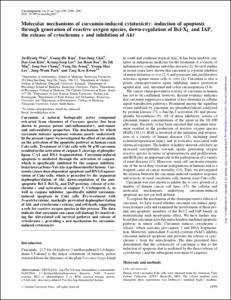Molecular mechanisms of curcumin-induced cytotoxicity: induction of apoptosis through generation of reactive oxygen species, down-regulation of Bcl-XL and IAP, the release of cytochrome c and inhibition of Akt
- Keimyung Author(s)
- Bae, Jae Hoon; Park, Jong Wook; Kwon, Taeg Kyu
- Journal Title
- Carcinogenesis
- Issued Date
- 2003
- Volume
- 24
- Issue
- 7
- Abstract
- Curcumin, a natural, biologically active compound
extracted from rhizomes of Curcuma species, has been
shown to possess potent anti-inflammatory, anti-tumor
and anti-oxidative properties. The mechanism by which
curcumin initiates apoptosis remains poorly understood.
In the present report we investigated the effect of curcumin
on the activation of the apoptotic pathway in human renal
Caki cells. Treatment of Caki cells with 50 mM curcumin
resulted in the activation of caspase 3, cleavage of phospholipase
C-g1 and DNA fragmentation. Curcumin-induced
apoptosis is mediated through the activation of caspase,
which is specifically inhibited by the caspase inhibitor,
benzyloxycarbony-Val-Ala-Asp-fluoromethyl ketone. Curcumin
causes dose-dependent apoptosis and DNA fragmentation
of Caki cells, which is preceded by the sequential
dephosphorylation of Akt, down-regulation of the antiapoptotic
Bcl-2, Bcl-XL and IAP proteins, release of cytochrome
c and activation of caspase 3. Cyclosporin A, as
well as caspase inhibitor, specifically inhibit curcumininduced
apoptosis in Caki cells. Pre-treatment with
N-acetyl-cysteine, markedly prevented dephosphorylation
of Akt, and cytochrome c release, and cell death, suggesting
a role for reactive oxygen species in this process. The data
indicate that curcumin can cause cell damage by inactivating
the Akt-related cell survival pathway and release of
cytochrome c, providing a new mechanism for curcumininduced
cytotoxicity.
- Publisher
- School of Medicine
- Citation
- Ju-Hyung Woo et al. (2003). Molecular mechanisms of curcumin-induced cytotoxicity: induction of apoptosis through generation of reactive oxygen species, down-regulation of Bcl-XL and IAP, the release of cytochrome c and inhibition of Akt. Carcinogenesis, 24(7), 1199–1208. doi: 10.1093/carcin/bgg082
- Type
- Article
- ISSN
- 0143-3334
- Appears in Collections:
- 1. School of Medicine (의과대학) > Dept. of Immunology (면역학)
1. School of Medicine (의과대학) > Dept. of Physiology (생리학)
- 파일 목록
-
-
Download
 oak-aaa-00004.pdf
기타 데이터 / 368.37 kB / Adobe PDF
oak-aaa-00004.pdf
기타 데이터 / 368.37 kB / Adobe PDF
-
Items in Repository are protected by copyright, with all rights reserved, unless otherwise indicated.